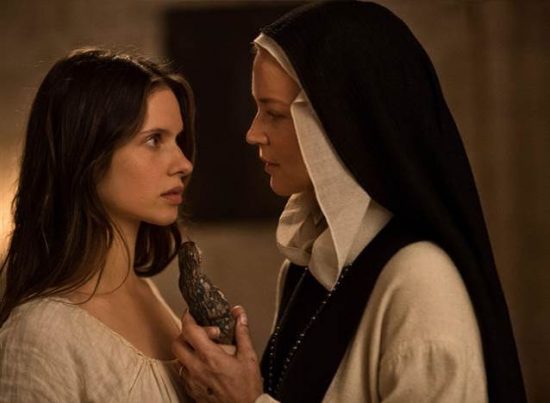Review: Benedetta – “The film delves into themes of love, faith and abuses of power”
Director Paul Verhoeven is famous in English-speaking countries for directing films including Robocop (1987), Total Recall (1990) and Basic Instinct (1992), which are notable for their impact on popular culture and bringing a European sensibility to penetrate American evangelism. Benedetta is no exception, marrying a critique against organised religion and the church with eroticism and corruption. In hollow terms, the plot of Benedetta may sound like a raunchy paperback – two nuns who fall in love and take on the church – were it not based on true events in 17th Century Pescia, Tuscany.
The story centres on the titular Benedetta (Virginie Efira) joining a convent, where her faith in Christ is so strong she believes herself to be a saint. We’re brought into Benedetta’s ‘visions’ of Christ and their conversations, where Verhoeven delicately balances the prophetic visions against outright delusions. At one point Christ acts as we’re accustomed to seeing him, unarmed and pacifying – the next he’s brandishing a sword atop a horse, a veritable knight in shining armour. It’s through these visions that Benedetta believes herself to be anointed by god, just around the same time a new nun – Bartolomea – joins the convent and begins to fall in love with her.
Bartolomea (Daphne Patakia) and Benedetta slowly explore their sexuality against the backdrop of their faith. It’s an interesting debate the film wants to delve into, but it almost gets swept away by Benedetta suddenly having the wounds of Christ. The film shifts to whether she is a saint or a fraud, as the convent and the priests try to discern this while battling with the rise of the plague in Tuscany.
Set in the 17th Century, the attitudes to sex are obviously dated (even outside the convent), but the film spends a lot of time underlining how little pleasure there is in this period. Bartolomea enters the convent seeking refuge from her abusive father and brothers, finding comfort in Benedetta and little else. Other characters have to deal with horrible afflictions most notably the plague with little knowledge on how to stop it. The urge to romanticise the past is avoided and is all the better for it.
Once Benedetta has risen to the top (replacing the previous head nun) she uses her power to get herself and Bartolomea a private room. From there the film openly explores their sexuality as you would expect from Paul Verhoeven – full nudity. Verhoeven has been open about sex being a human trait to be explored as any other and he doesn’t stop here. The clash between religion and sexuality culminates in Bartolomea taking a religious symbol she has no reverence for to penetrate Benedetta who does have reverence. It’s an interesting shift as Benedetta continues to abuse her power and feeds her arrogance.
The film delves into themes of love, faith and abuses of power, but its critique of the church feels both scathing and toothless. In less accomplished hands this film wouldn’t be as memorable to watch and while I’m glad I saw it, I don’t know who else would until they watch it for themselves.










